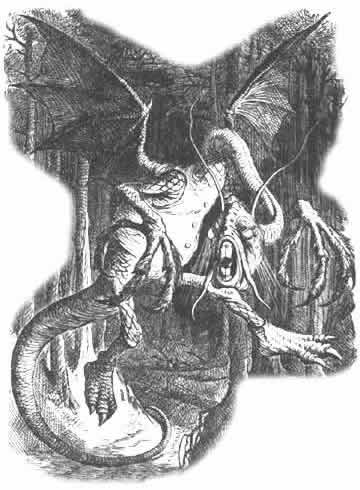- Jabberwocky
- 'Twas brillig, and the slithy toves
Did gyre and gimble in the wade;
All mimsy were the borogoves,
And the mome raths outgrabe.
"Beware the Jabberwock, my son!
The jaws that bite, the claws that catch!
Beware the Jubjub bird, and shun
The frumious Bandersnatch!"
He took his vorpal sword in hand:
Long time the manxome foe he sought --
So rested he by the Tumtum tree.
And stood awhile in thought.
And as in uffish thought he stood,
The Jabberwock, with eyes of flame,
Came wiffling through the tulgey wood,
And burbled as it came!
One, two! One, two! And through and through
The vorpal blade went snicker-snack!
He left it dead, and with its head
He went galumphing back.
"And hast thou slain the Jabberwock?
Come to my arms, my beamish boy!
O frabjous day! Callooh! Callay!"
He chortled in his joy.
'Twas brillig, and the slithy toves
Did gyre and gimble in the wabe;
All mimsy were the borogoves,
And the mome raths outgrabe.
--Lewis Carroll

Mike actually memorized this poem before I did. There was a certain amount of competition in our family growing up--I don't know if the boys noticed it, but I felt like I had to be able to do certain things that they could do, or I'd lose some respect. I had no great personal need to memorize the alphabet backwards, but since Mike and Doug could, I felt like I had to as well, so every time I got one of those alphabet plates at lunch, I'd practice. That's also the only reason I ever climbed up and crossed the rope bridge. I had to practice doing that too, so that the boys couldn't tell just how much it scared me (even going into the little treehouse scared me, to be honest). So anyway, when Mike memorized this poem, I felt like I had to as well. I later used it to fulfill an assignment for Mrs. Mertz's class (5th or 6th grade English), where we were supposed to memorize and recite a poem. I didn't get very good peer reviews, because none of them said they could understand my enunciation--they didn't get that it was supposed to be gibberish. Oh, well.

















